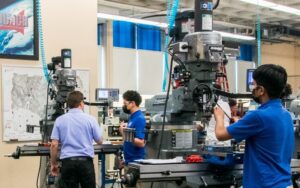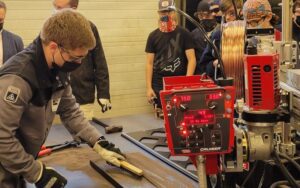
Students from Passaic County Technical-Vocational Schools engage in a manual milling project as part of their coursework in the prototype machining and design program.
In an expansive two-story space that could easily be mistaken for a warehouse, Essex County Schools of Technology students are putting the finishing touches on a scaled-down version of a family home. In that very same space, another group is in the early stages of constructing a second small house. Students in carpentry, electrical, masonry and plumbing programs are not only honing skills of their respective trades, but learning how to work together to move the projects forward.
John Dolan, director of adult, career and technical education, said the large collaborative space in the district’s new Donald M. Payne Sr. School of Technology started a few years ago as a “blank canvas.” Program instructors — all with significant industry experience — and program advisers helped design the layout and influenced equipment purchased, aiming to include “what the professionals are actually using on the job.”
This is a prime example of a career classroom, and it is not unique to the Essex County Schools of Technology. Across the state, county vocational-technical schools offer students immersive training experiences in highly customized spaces resembling real-world settings. They create these unique learning environments with county support and federal funding, making their specialized career classrooms hard to replicate in traditional high schools.
At Burlington County Institute of Technology, secondary and postsecondary dental assistant students gain clinical experience without ever leaving school grounds. Four treatment rooms, called dental operatories, are fully operational with a patient’s chair, operator’s chair, assistant’s chair, X-ray unit and handpieces, in addition to PPE and sterilized and packaged equipment.
“You would mistake our classroom for a dentist’s office if only we had a reception area,” said the BCIT program director and dental occupation teacher, Claire Heston.
Heston said federal funding helps her obtain the most up-to-date equipment, including the latest in sterilization technology and a modern impressions scanner that both students and patients prefer to the old way of “shoving goo in the mouth.”
“I get feedback from doctors all the time about how well-prepared my students are,” she said, adding several doctors serve as program advisers. “They are invested in the success of this program, many concerned by a shortage of qualified dental assistants. Our high school dental occupations program is the only one of its kind in the state, and our adult program is among only four New Jersey programs accredited by the Commission on Dental Accreditation.”
Three of those four adult dental assisting programs are housed at county vocational-technical schools. Camden and Cape May county schools offer the other two accredited programs.
A dedicated advisory committee helps keep the prototype machining and design program at Passaic County Technical-Vocational Schools’ School of Applied Engineering in step with the ever-evolving advanced manufacturing industry. Students gain the technical training needed to have success in the field, learning on industry-standard technology that has become increasingly sophisticated. Within the state-of-the art classroom is high-tech Hass Computer Numerical Control equipment and the latest Mastercam CAD/CAM software.
“Our advisory committee members give us recommendations for equipment and support our instructors with training and suggestions for curriculum,” said Mark Cacace, supervisor of instruction for Passaic County Technical-Vocational Schools. “Many of our partners from industry also work with us regularly to connect with our students and retain them as employees; they help students fulfill their career pathways; some even pay for students’ college tuition.”
Cacace said the program consistently has a high placement rate for its senior class — this year, nearly 100% have committed to the next steps on their career pathways.
“The need for highly skilled employees in this industry is growing, and we have worked to meet that need by increasing the abilities and availability of our students,” he said.
He added that employers appreciate how Passaic students learn to “walk before they run,” meaning they start with the basics. They use hand tools before moving to manual machining and then computerized controls.
“To house all of this requires a lot of real estate, and we can support it,” he said.
Four county vocational-technical schools in southern New Jersey are adding to existing career classrooms in preparation for future workforce demands. According to the New Jersey Offshore Wind Strategic Plan, the state’s expansion of offshore wind power will create 6,000 to 8,000 jobs per year, culminating in 68,349 new jobs between 2020 and 2035. The schools are working with state entities and industry experts to build training programs to support these clean energy manufacturing jobs coming to the state.

Gloucester County Institute of Technology hosts a demonstration using a new sub arc welding machine for students, staff and additional stakeholders invested in the school’s role to help develop skilled workers to support New Jersey’s offshore wind industry. View a video here.
Gloucester County Institute of Technology received the first sub arc welding machine sponsored by Lincoln Electric and EEW American Offshore Structures. The school opened its doors to welding instructors from Camden, Cumberland and Salem counties who have recently, or soon will, acquire the machine. The instructors engaged in training led by Lincoln Electric.
“Down the road, they’ll be putting in the same equipment in their welding shops to teach their students and postsecondary students so we can supply quality welders to build the towers for the wind turbines that will be located offshore,” GCIT welding instructor Dan Roskiewich explained.
EEW is constructing a state-of-the-art manufacturing facility to build steel components, known as monopiles, for the foundation of the offshore wind turbines across the Eastern Seaboard. This facility, located in Gloucester County’s town of Paulsboro, will need hundreds of workers for the project, the majority of whom are welders and painters.
With financial support from the New Jersey Economic Development Authority, GCIT will obtain additional equipment, including a specialized paint sprayer, and run evening and weekend classes to extend training opportunities to adults.
“Students ranging in ages will have access to this newest equipment to learn and prepare for the jobs coming to our area,” said GCIT Superintendent Michael C. Dicken, who also serves as president of the New Jersey Council of County Vocational Technical Schools. “At the core of our mission — among all county vocational-technical schools — is preparation. We achieve it through partnerships.”
Conversation Starter
County vocational-technical schools welcome new employer partners to support career training programs across all industries. Visit careertechnj.org/become-an-employer-partner to explore a partnership.
This series on education and industry is presented by the New Jersey Council of County Vocational-Technical Schools.
This article originally appeared June 1 in ROI-NJ.



